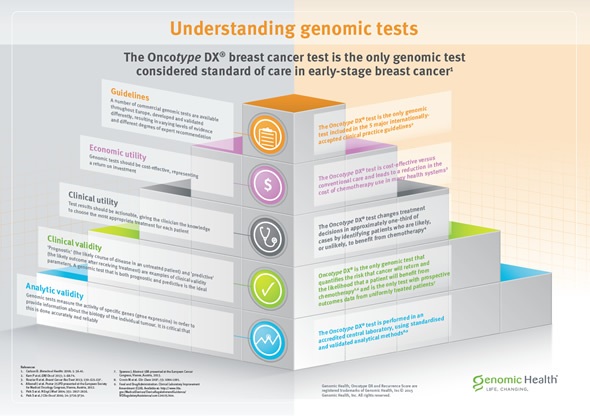Genomic Health has announced the presentation of the first results1 from the Trial Assigning IndividuaLised Options for Treatment (Rx), or TAILORx, a large, prospectively conducted trial designed and conducted by the ECOG-ACRIN Cancer Research Group under the sponsorship of the U.S. National Cancer Institute (NCI).
The study demonstrated that a group of trial participants with early-stage breast cancer and with low Oncotype DX Recurrence Score results of 10 or less who received hormone therapy alone without chemotherapy had less than a one percent chance of distant recurrence at five years. Presented at the 2015 European Cancer Congress (ECC2015), results from a group of 1,626 patients with a Recurrence Score result between 0 and 10 demonstrated that 99.3 percent of patients with node-negative, oestrogen receptor-positive, HER2-negative breast cancer who met accepted guidelines for recommending chemotherapy in addition to hormone therapy had no distant recurrence at five years after treatment with hormone therapy alone. Outcomes were excellent irrespective of patient age, tumour size, and tumour grade.

‘The findings of the TAILORx trial are compelling and consistent with the experience in my clinical practice,’ said Nigel Bundred, Professor in Surgical Oncology, University Hospital of South Manchester NHS Foundation Trust. ‘The Oncotype DX test allows for a better understanding of individual tumour biology and gives greater confidence in recommending a treatment plan best suited for an individual patient. The test should be routinely used for all patients who are considered for chemotherapy throughout the country.’
Based on guidance from the National Institute for Health and Care Excellence (NICE)*, the Oncotype DX breast cancer test is available through an access scheme as an option to help National Health Service (NHS) clinicians in England decide whether to prescribe chemotherapy in people with early breast cancer.
It is the only genomic test validated for its ability to predict the likelihood of chemotherapy benefit as well as risk of recurrence in early-stage breast cancer. Research shows that less than 10% of patients with early-stage breast cancer actually benefit from chemotherapy†,‡ and almost a third of treatment recommendations for UK patients diagnosed with early breast cancer change once the result of the Oncotype DX test is known.§
Oncotype DX Recurrence Score used to select treatment and optimise outcomes
Complementing the data from TAILORx, Genomic Health announced presentation of real-world clinical outcomes from a large cohort of patients in the Clalit registry2. Over half of the 930 patients in the analysis were identified as low-risk and were treated with hormone therapy alone based on Recurrence Score results. A nearly six-year follow-up showed very high survival rates (99.8%) and low distant recurrence rates (0.5%) in this patient group.
Survival and recurrence rates in patients with high Recurrence Score results, most of whom received chemotherapy, were 96% and 4% respectively while for patients in the intermediate group survival and recurrence rates were 98.8% and 2.3% respectively.
‘Results from our registry suggest that adding molecular information provided by the Oncotype DX test is essential in order to spare low-risk patients the toxicity and side effects of chemotherapy,’ said Prof Salomon Stemmer, Lead investigator of the study, Department of Oncology, Davidoff Center, Rabin Medical Center affiliated to Tel Aviv University, Israel. ‘Knowing that Oncotype DX is predictive of chemotherapy benefit gave us confidence to move forward with appropriate, individualised treatment for each patient.’
Clalit is an analysis of medical records of patients receiving the Oncotype DX breast cancer test in four medical centers within Clalit Health Services, the largest health services organisation in Israel. Researchers will continue to follow patients and report results and outcomes.
About the TAILORx trial
The trial enrolled 10,273 patients across 1,182 community-based medical facilities and major cancer centers in the United States, Canada, Peru, Ireland, Australia and New Zealand. TAILORx used the Oncotype DX test on every patient to quantify individual risk of recurrence in order to assign them to the appropriate treatment. The data safety monitoring board of the TAILORx trial, as mandated by the study protocol, will continue to monitor outcomes in patients with a Recurrence Score result of 11 to 25 randomised to chemo-endocrine therapy or endocrine therapy alone. Previous Oncotype DX studies have already confirmed the benefit of adjuvant chemotherapy for those in the high Recurrence Score range.
About Genomic Health
Genomic Health, Inc. is a world-leading provider of genomic-based diagnostic tests that inform treatment decisions and help to ensure each patient receives appropriate treatment for early stage cancer. The company applies its state-of-the-art scientific and commercial expertise and infrastructure to translate significant amounts of genomic data into clinically actionable results for treatment planning throughout the cancer patient's journey; from screening and surveillance, through diagnosis and treatment selection. The company is based in Redwood City, California with the local UK office in London. For more information, please visit, www.GenomicHealth.co.uk. To learn more about Oncotype DX, visit: www.OncotypeDX.com
* NICE diagnostics guidance [DG10]. Available at: http://www.nice.org.uk/guidance/DG10
† Paik S et al. J Clin Oncol 2006;24:3726-34
‡ Early Breast Cancer Trialists’ Collaborative Group (EBCTCG), et al. Lancet. 2012:379;432-444
§ Holt S, et al. Br J Cancer. 2013 Jun 11; 108(11):2250-8